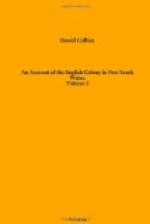On the 11th arrived the Mercury, an American brig, from Manilla, bound to the NW coast of America. Being extremely weak and leaky, the master put in here to refit, which he requested he might be allowed to do. He brought no other news than the detention of several English ships at Manilla, which seemed strongly to indicate the approach of hostilities between the two nations, the effect, no doubt, of French fraternity with the Spaniards.
The infant part of the settlement having at this period become very numerous, with a view to save them, if possible, from that ruin in which the infamous examples of their abandoned parents were but too likely to plunge them, the clergyman, the Reverend Mr. Johnson, began to examine them publicly every Sunday in their catechism, and other points of religious duty, at the conclusion of the afternoon service. Some building that might serve as a school whereto children at a certain age might be removed from their parents, and receive education, was now become absolutely necessary; but many other works equally necessary were still in hand; and the labourers employed to erect them were comparatively so inefficient, that it was impossible to think of any other work until they were completed, though both the clergymen offered their services to superintend the erection of a building for this purpose.
Such was the weakness of the public gangs, that it often became necessary to require the assistance of the officers and other persons who were allowed servants from government. In this way, by calling on each officer and settler to send in a certain number of men for three days in the week, the public roads between the different districts were put into good order. This, besides very much facilitating the carriage of goods by land, conduced very essentially to the detecting of thieves and vagrants, who in general were found to be very quick in their motions.
Among other crimes which had been committed in this colony, that of forgery was by no means neglected. To this, the currency of the settlement, consisting almost entirely of paper, had opened a door. On the 20th one man was found guilty of uttering a bill, knowing it to be forged, and condemned to suffer death. The prisoner, whose name was Lawrence Davoran, had been sent from Ireland, with other convicts from that kingdom, where he had practised as an attorney, and had, it was said (unfortunately for them, if true) respectable connections by marriage. He was very far from being a good character. The governor, however, after ordering the execution to take place on a certain day, spared his life, on condition of his being transported to Norfolk Island during the remainder of his wretched existence.




